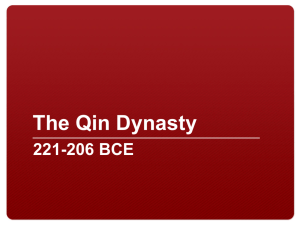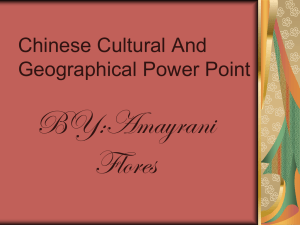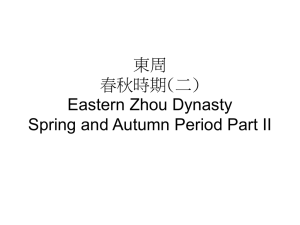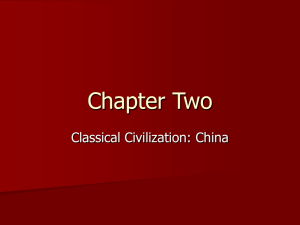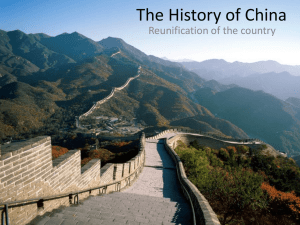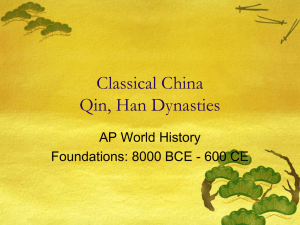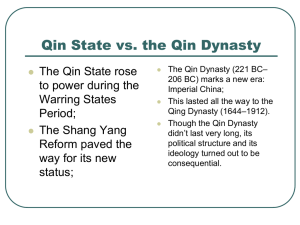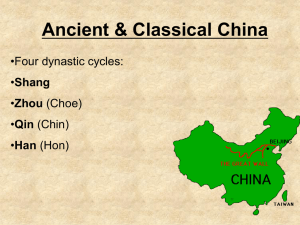Warring States
advertisement
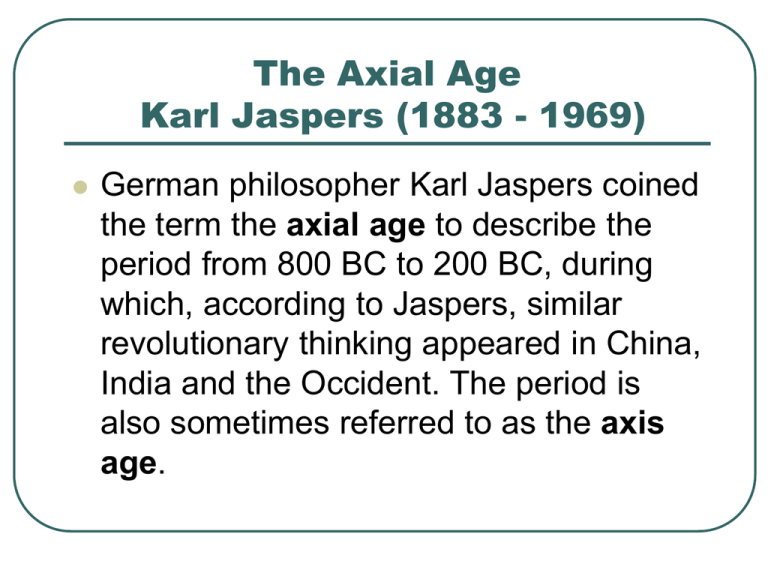
The Axial Age Karl Jaspers (1883 - 1969) German philosopher Karl Jaspers coined the term the axial age to describe the period from 800 BC to 200 BC, during which, according to Jaspers, similar revolutionary thinking appeared in China, India and the Occident. The period is also sometimes referred to as the axis age. Karl Theodor Jaspers (February 23, 1883 – February 26, 1969) was a German psychiatrist and philosopher who had a strong influence on modern theology, psychiatry and philosophy. After being trained in and practicing psychiatry, Jaspers turned to philosophical inquiry and attempted to discover an innovative philosophical system. A Striking Parallel Jaspers, in his Vom Ursprung und Ziel der Geschichte (The Origin and Goal of History 1953), identified a number of key axial age thinkers as having had a profound influence on future philosophy and religion, and identified characteristics common to each area from which those thinkers emerged. Jaspers saw in these developments in religion and philosophy a striking parallel without any obvious direct transmission of ideas from one region to the other, having found no recorded proof of any extensive intercommunication between Ancient Greece, the Middle East, India, and China. Jaspers held up this age as unique, and one to which the rest of the history of human thought might be compared. Hundred Schools of Thought 諸子百家 zhūzǐ bǎijiā The term that literally means "all philosophers, hundred schools“ refers to philosophers and schools that flourished from 770 to 221 B.C.E., an era of great cultural and intellectual expansion. It is also known as the Golden Age of Chinese philosophy because a broad range of thoughts and ideas were developed and discussed freely. This phenomenon has been called the Contention of a Hundred Schools of Thought (百家爭鳴 bǎijiā zhēngmíng). Professor David R. Knechtges prefers a different term: Masters instead of philosophers. The word “hundred” seems exaggerated. Nevertheless, it is the golden age in Chinese intellectual history. However, since the Han synthesis, Confucianism has gained its dominant position. Jixia Academy: Athens in China in the State of Qi The Jixia Academy or Academy of the Gate of Qi/Chi-- 稷下学宫 was the most famous scholarly academy of early China. It was founded around 318 BC in the city of Linzi 临淄, capital of the state of Qi (modern Shandong province), and Jixia was a gate in the city wall. At the time, Linzi was one of the largest, most prosperous cities in the world. For the first time on record a state began to act as a patron of scholarship out of the apparent conviction that this was a proper function of the state or a means of increasing its prestige. Scholars came from great distances to lodge in the academy, with the most important scholar holding the rank of Great Prefect. Pre-Qin (221 BC) Prose Writing Historical Prose & Philosophical Prose 1. 尚书【shàngshū】 Classic of History "Classic of History", "Classic of Documents", "Book of History", "Book of Documents". 2. 春秋【chūnqiū】 the Spring and Autumn Period (770-476 B.C.); The Spring and Autumn Annals; annals; history-- is the official chronicle of the State of Lu covering the period from 722 BCE to 481 BCE. Intrigues of the Warring States 3. 战国策【Zhànguó Cè】 Intrigues/Strategies of the Warring States 4. Zuo Zhuan--the Commentary of Zuo, 389 BC Zi , ancient title of respect for learned or virtuous man, masters. Confucianism: The Analects (put together by his students); Mencius by Mengzi and Xunzi; Daoism: Dao De Jing and Zhuanzi/Liezi Legalism: Shang Yang, Li Si, and Han Fei Mohism by Mozi Philosophical Military Treatise: The Art of War by Sunzi The Warring States Period 403 BCE to 256 BCE Partition of the Jin State (403 BC) Political Hierarchy Defined by Rites/Rituals of the Zhou Dynasty Son of Heaven = Emperor duke, in charge of a state marquis; a nobleman or high official; Ministers http://dictionary.reference.co m/browse/marquis?s=t If an emperor couldn’t go to Mt. Tai, he had to build a temple; The Temple of Heaven in Beijing serves such a function; Only a son of heaven can own nine ding, sacred cauldrons, symbolic of status; At court, only a son of heaven can order 64 dancing girls, 8 per row/per line; Who are qualified to go to Mt. Tai to perform feng and shan sacrificial ceremonies? During Duke of You’s (晋幽公) r. 433 to 416 BC Three ministers or houses, Zhao, Han and Wei started to divide some territory. In 416, Marquis Wen of Wei 魏文侯 killed Duke of You. Marquess Wen of Wei 魏文侯 (?~396 BC) Wei became rich by controlling salt. (capital of salt industry, 盐池). Along with its salt business, Wei established a strong army. A well-learned man Three Households/Ministers Divided the State of Jin Duke Lie of Jin 晉烈公 415 BC - 389 BC In about 401, Zhi Boyao 智伯瑶, a senior minister who became the “Secretary of the State,” demanded more land from other ministers: Wei Zi 魏斯, Zhao Ji 赵籍 and Han Qian 韩虔. Duke of Lie could not control his state at all. Wei and Han bowed to Zhi, but Zhao refused. Zhi Attacking Zhao A Dramatic Turn Zhi led the mid-army; Wei led the left army; Han led the right army; Three armies surrounded Jin Yang 晋阳 for two years. Zhi used water (River Jin) as soldiers 以水代兵 and had Jin Yang flooded. 搬起石头砸自己的脚: the rock he lad lifted landed on his own feet. To plan to make somebody else miserable but end up getting hurt themselves. Jin Yang was in great danger. Zhao appealed to Wei and Han. When boasting about his strategy on the bank of River Jin, it dawned on Wei and Han that they can use the same trick. Teamed up with Zhao, they let go the water from a branch of River Jin, thus had Zhi’s territory flooded. Zhi 智伯瑶 was killed during the battle. In 403, Wei, Zhao, and Han went to see the king of Zhou, demanding the status of a state. The new status was officially granted. This incident marked the beginning of the Warring States Period. What Shifted the Power Structure at a Critical Moment? Power of Rhetoric Zhao Xiangzi or Zhao Ji convinced Wei and Han that if they don’t stick together, the Zhi family will swallow them one by one sooner or later. 唇亡齿寒 【chúnwángchǐhán】 if the lips are gone, the teeth will be cold; if one (of two interdependent things) falls, the other is in danger; share a common lot. Potential Danger in the Partition of the Jin http://www.globaled.org/chinaproject/confuci an/quotes1.html Fragmentation vs. Unification Lessons from Russia China is in chaos. What is the best for China: united or divided? If China were fragmented, what would be its impact on the world? After the First Opium War in 1842, China was divided by invaders from the outside. Partition of China How to maintain order? Contextualize the significance of Confucianism in China Impact of family structure and individual conduct on government/nation Confucius cites The Book of Document, “…Simply by being a good son and friendly to his brothers a man can exert an influence upon government” (The Analects 2.21). Returning of a shopping cart… Guiguzi & Shang Yang Two Consequential Figures Shang Yang Reform ca. 390-338 BC a Chinese statesman and political philosopher. He was one of the founders of Chinese Legalism and organized the rise to power of the Ch'in dynasty. The first reform: 359 BC; The second reform: 350 BC; Content of Shang Yang’s Reform Establish the county system--31 total for a stronger centralized government; county magistrates are appointed directly by the central government; Household Registration system and chain punishment to tighten the leash; Grown up sons must live independently, which enlarged the population for tax purpose; Land Reform His most famous economic reform was the abolition of the idealized system of landholding known as the "well-field system," in which a section of land was divided into nine portions, tilled by eight families in common, with the produce from the ninth portion reserved for the overlord--廢井田 【fèijǐngtián】 開阡陌【kāiqiānmò】 crisscross footpaths between fields. Basically get rid of boundaries, carrying out private-ownership by commoners. This is a further development in Guan Zhong’s land reform; Private ownership marks a break from that of the Zhou Dynasty in which 分封制 【fēnfēngzhì】 the system of enfeoffment dominated, (of the Western Zhou Dynasty, c.11th. century-771 B.C., investing the nobility with hereditary titles, territories and slaves). 重农轻商 来自商鞅 【zhòngnóngqīngshāng láizì shāngyāng 】 Central to Shang Yang's economic theory was an over-whelming emphasis on agriculture and a rejection of "nonessential" activities such as commerce and manufacturing. He proposed that anyone engaging in secondary professions be sold as slaves; different from Guan Zhong’s model. In ancient China, merchants and businessmen suffered a bad reputation. Nowadays, many college students flood into business schools… Double-Edged Military Reform Establish a 20-rank military system on the one hand, and on the other hand, eliminate the old tenure system (which fundamentally challenged those princes). 取【qǔ】 cut “ear” off to claim credit The goal is to set up more centralized government. 据《漢書》記載:“商君 為法于秦,戰斬一首賜 爵一級,欲為官者五十 石”。 According to Han shu or Book of Han, Shang code regulates that someone could be promoted by one rank for one chopped-off head in battle or promoted as a minor officer whose salary is 50 shi of grain; a unit of dry measure for grain ( =1 hectolitre) Shang Yang’s Legal Code Appeal lies in Equality Central to Shang Yang’s new law is equality by which a prince be punished the same way as a commoner. 王子犯法与庶民同罪 a prince who commits a crime will be punished the same way as commoners. Once the crown prince Ying Si 嬴駟 or Zhao Si 赵驷 committed a crime—he killed someone (during a tax season when some cheating was involved), he was sent to an exile; and his teachers Ying Qian and Gongsun Jia was punished by 劓刑【yìxíng】 劓【yì】 cutting off the nose (a punishment in ancient China) Ying Si vs. Shang Yang Ying Si 赢驷 was the son of Duke Xiao 秦孝公, and succeeded his father as ruler of Qin after the latter's death. When Ying was still in his adolescent years as the crown prince, he committed a crime and was severely punished for it. Shang Yang was implementing his reforms to the laws of Qin then, and he insisted that the crown prince should be punished for the crime, regardless of his royal status. Duke Xiao approved of the draconian punishments and Ying Si's tutors, Prince Ying Qian and Gongsun Jia, had their noses cut off, for neglecting their duties in educating the crown prince, while Ying Si was banished from the royal palace. Shang Yang, a Chinese Draco It was believed that Ying Si harbored a personal grudge against Shang Yang and when he came to the throne as King Huiwen of Qin, Ying Si had Shang Yang put to death on charges of treason. However, King Huiwen retained the reformed systems in Qin left behind by his father and Shang Yang. Dra’conian punishments –adjective 1.of, pertaining to, or characteristic of Draco or his code of laws. 2.(often lowercase ) rigorous; unusually severe or cruel: Draconian forms of punishment. Draco (pronounced /ˈdreɪ.koʊ/; from Greek Δράκων, pronounced [ˈdra.kɔːn]) was the first legislator of ancient Athens, Greece, 7th century BC. He replaced the prevailing system of oral law and blood feud by a written code to be enforced only by a court. Because of its harshness, this code also gave rise to the term "draconian". Unified Ideology 定秦律,“燔詩書而明法令” Books burning per Qin’s Legal Code; As a result, Qin, either as a state or as an empire, did not leave much literature behind; the landscape is barren. It is a cultural wasteland. Unification of Weight and Measurement Unification in weight and measurement, which paved the way for later regulations standardized by Qinshihuang, the first emperor in China. Shang Yang’s Royal/Loyal Supporter 秦孝公Duke Xiao of Qin (381 BC - 338 BC) Duke Xiao is best known for employing the Legalist statesman Shang Yang from the Wei state (衛), and authorizing him to conduct a series of upheaving political, military and economic reforms in Qin. Although the reforms were potentially controversial and drew violent opposition from many Qin politicians, Duke Xiao supported Shang Yang fully and the reforms did helped to transform Qin into a dominant superpower among the Seven Warring States. 秦孝公 Duke Xiao of Qin In a recent TV series, The Great Qin Empire, Duke Xiao of Qin is depicted more like a brother to Shang Yang than a king. Posters The Great Qin Empire More brotherlike Legalism: Rule by Law Legalists: Shang Yang; Li Si; and Han Feizi Legalism was a system that proved to be quite effective in gaining power but was problematic for establishing a stable political power. The doctrine of Legalism originated in the practical political operations of the State of Qin. In the 3rd century BCE, the philosopher Han Fei developed an intellectual rationale for Legalism. Han Fei argues that people need careful guidance by strong rulers to live in an orderly society. The Qin State, with Legalism as its ideology, succeeded in ending the Warring States era. Theoretical Rationale for Shang Yang’s Reform The prime minister of Qin in the mid-4th century BCE was Shang Yang who set out the basic ideas of Legalism. The central principle of Legalism was the use of rewards and punishments to produce conformity to the rule of clear and welldeveloped laws. The law was to be applied uniformly and strictly to both high and low so that everyone understood their duties and knew the penalties for failing to fulfill them. Is Human Nature Good or Evil? Implicit or explicit behind Shang Yang’s model of rewards and punishments lies a crucial question regarding whether human nature is good or evil. Xunzi or Xun Kuang: Human Nature is Evil; the essay is uploaded online on our class website; (See Xun Kuang ppts) Mencius: Human nature is good… Two Idioms associated with Shang Yang 徙木为信 【 xǐmùwéixìn 】 Before the new law was promulgated, A three-yard pole to be moved from the south gate to the north gate for 50 gold pieces—to establish credibility Shiji 68: The Biography of Lord Shang See Burton Watson’s translation: The Record of the Grand Historian, Qin Dynasty published by Columbia University Press, page 93 作法自毙 【zuòfǎzìbì】 make a law only to fall foul of it oneself; be hoist with or by one's own petard; get caught in one's own trap. Right after Duke Xiao of Qin passed away, Shang Yang tried to escape. He could not even check into a hotel without an ID, a law made by himself; 车裂【chēliè】 tearing a person asunder by horse-drawn chariots going in five directions. Wang Xu 王诩, better known by his pseudonym Guiguzi 鬼谷子 A philosopher from the Warring States Period. He was the founder of the School of Diplomacy of the Hundred Schools of Thought during that period. According to popular belief, Guiguzi was a master of politics, diplomacy, military strategy and fortune-telling. Guiguzi was born in Gui Valley (归谷) in present-day Dengfeng County, Henan province. As the pronunciation of the Chinese character of "归" (meaning: return) is quite similar to "鬼" (meaning: ghost; demon), Guiguzi's birthplace was hence popularly referred to as "Guigu" (鬼 谷; Ghost Valley or Demon Valley). Political Strategists 纵横家【zònghéngjiā】 Political Strategists (in the Warring States Period, 475221 B.C.) . 纵横【zònghéng】 in length and breadth; vertically and horizontally; 经纬【jīngwěi】 warp and woof; longitude and latitude; The earliest records of Guiguzi were found in historian Sima Qian's Records of the Grand Scribes/Historian, in which it was stated that Guiguzi was the teacher of famous diplomats, statesmen and military strategists, including Su Qin, Zhang Yi, Sun Bin and Pang Juan. Sun Bin (? - 316 BC) was a military strategist who lived during the Warring States Period. An alleged descendant of Sun Tzu, Sun Bin was tutored in military strategy by the hermit Guiguzi. The Art of War 孙子兵法 Required Reading of MBAs in US http://www.chinapage.com/sunzi-e.html The Art of War is a Chinese military treatise that was written by Sun Tzu in the 6th century BC, during the Spring and Autumn period. Composed of 13 chapters, each of which is devoted to one aspect of warfare. See the text online Lionel Giles (1875 - 1958) http://www.chinapage.com/sunzi-e.html a Victorian scholar, translator and the son of British diplomat and sinologist, Herbert Giles. Lionel Giles served as assistant curator at the British Museum and Keeper of the Department of Oriental Manuscripts and Printed Books. Lionel Giles is most notable for his 1910 translation of The Art of War by Sun Tzu and The Analects of Confucius. 吴王阖庐 Duke He Lü of Wu (?-496 BC) in 515 BC the prince ascended the throne of Wu and became King Helü. The king assigned Wu Zixu 伍子胥 to lead the design and building of the "great city," which evolved into the city of Suzhou today. 上有天堂,下有苏杭【shàngyǒutiāntáng,xiàyǒusūháng】 Just as there is paradise in heaven, there are Suzhou and Hangzhou on earth. In 506 BC Helü with the help of Wu Zixu and Sun-tzu, the author of The Art of War, launched major offensives against the state of Chu. They prevailed in five battles, one of which was the Battle of Boju 柏舉之戰 506 BCE) , and conquered the capital of Ying (Chinese: 郢). Sun Wu (c. 544 BC - c. 496 BC) An anecdote goes as follows: The king of Wu tested Sun Tzu's skills by commanding him to train a harem of 180 concubines into soldiers. Sun Tzu divided them into two companies 连 , appointing the two concubines most favored by the king as the company commanders 连长. When Sun Tzu first ordered the concubines to face right, they giggled. In response, Sun Tzu said that the general, in this case himself, was responsible for ensuring that soldiers understand the commands. Then, he reiterated the order, and again the concubines giggled. Sun Tzu then ordered the execution of the king's two favored concubines, to the king's protests. Sun Wu & Mao Zedong Brenden Mclane, 2009 The Art of War’s most governing principles were as follows: first, know yourself, your enemy, and the situation in which you must fight; second: fight only if you absolutely must; third, speed, decisive action, and discipline are what win battles, not force. These three general ideas form the basic framework for the way of war know as “guerilla warfare 游击战【yóujīzhàn】 bushwhacking..” Sun Bin vs. Pang Juan Both Studied with Guiguzi Sun Bin (?- 316 BC) memorized The Art of War; Sworn Brothers; Upon his departure, Guiguzi gave Sun Bin a slip of paper; In State of Wei, Pang Juan tricked Sun Bin and had his kneecaps removed/feet cut off and had his face tattooed; Escape to Qi In jail, Sun Bin tried to write down The Art of War for Pang Juan; A servant revealed the true intention of Pang Juan; Sun Bin feigned madness as Hamlet did, which was the strategy from his teacher as the last resort; Sun Bin escaped to the State of Qi Horse Racing 田忌赛马 Deliberate Mismatch in Competition Sun Bin’s friend Tian Ji, a general in Qi, loved horse racing, but he always lost the game. Sun Bin’s advice: Third class horse vs. Duke Qi’s best horse; First class horse vs. Duke Qi’s second class horse; Second class horse vs. Duke Qi’s third class horse; 田忌经常与齐国诸公子赛马,设重 金赌注。孙膑发现他们的马脚力都 差不多,可分为上、中、下三等。 于是孙膑对田忌说:“您只管下大赌 注,我能让您取胜。”田 忌相信并答 应了他,与齐王和诸公子用千金来 赌注。比赛即将开始,孙膑说:“现 在用您的下等马对付他们的上等马 ,拿您的上等马对付他们的中等马 ,拿您的中等 马对付他们的下等马 。”三场比赛完后,田忌一场不胜而 两场胜,最终赢得齐王的千金赌注 。于是田忌把孙膑推荐给齐威王。 威王向他请教兵法后,就请他当作 老 师。 “田忌赛马”在后世亦成为“错位竞 争”的代名词 及典型案例,在商 战及体育竞赛中时有运用。 Tian Ji won 1000 pieces of gold; Battle of Guiling 354 BC 围魏救赵 【wéiWèijiùZhào】 besiege Wei to rescue Zhao - relieve the besieged by besieging the base of the besiegers. Marshaled by Pang Juan, Wei attacked Zhao. Zhao’s capital Han Dan was in great danger. Instead of going directly to Han Dan, which will exhaust Qi’s troops, Sun Bin suggested Qi attack Wei’s capital Daliang (now Kaifeng, Henan Province); On his way back to the capital, Pang Juan was ambushed by Qi’s troops; Pang Juan was caught alive! Battle of Maling (342 BC) Dazhangjia Town (大張家鎮), Xin County (莘縣), Henan Province In 342, Pang Juan attacked the State of Han (403 BC–230 BC). Sun Bin suggested Qi’s troops wait till both sides got exhausted. After 5 rounds of bloody fighting, Qi sent its troops to Han’s capital (now Yuzhou). Qi’s troops pretended defeated and escaped; en route, they reduced the number of camp fires for cooking for bivouac (French) , a way to estimate how many troops involved. At Maling, a valley like a long sack, Pang Juan was ambushed. 在桂陵之战后,庞涓不服输,而魏 王亦想扩张领土,因此在公元前 342 年,魏王派庞涓进攻邻近弱国、韩 国 。韩国向齐国求援,孙膑向齐威 王提议坐山观虎斗,待魏韩火拼一 番后才出兵救援,这样则“尊名”与“ 重利”皆得。结果在韩国奋战五场皆 败后,齐王派 田忌及孙膑统兵去救 韩国。庞涓这次直接回兵与孙膑决 战,孙膑则选择避其锋芒,以减灶 之计成功引诱庞涓进入预定埋伏地 点,万箭齐发,大败庞涓,逼使庞 涓自 杀,报回当年被害之仇。从此 齐国称霸东方,魏国则每况越下, 无力争霸。 Battle of Maling Intrigues of the Warring States 战国策【Zhànguócè】 One Origin for the Warring States (403-221 B.C.) The Zhanguo ce is a collection of 497 items pertaining to the Warring States Period. Most are short fables, speeches put in the mouths of historical figures, and anecdotes. The present version is based on an edition prepared by Liu Xiang 劉向 (ca.79-ca. BC), who selected from six different collections of Warring States stories and speeches that allegedly were derived from the actual words of youshui 游说 (traveling persuaders). Liu Xiang 劉向 (ca.79-ca. BC) born Liu Gengsheng (劉更 生), courtesy name Zizheng (子政), was a famous Confucian scholar of the Han Dynasty. He was born in Xuzhou 徐州 (known as Pengcheng 彭城 in ancient times) and related to Liu Bang 刘邦, the founder of the Han dynasty. His son, Liu Xin, developed the "Triple Concordance" 《三統 曆譜》 astronomical system. Su Qin, an advocate of zong 纵, or Confederation against the Qin State Su Qin (380-284 BCE), was an influential political strategist during the Warring States Period. He was born in Chengxuan Village, Luoyang in present day Henan Province. According to some legend, Su Qin was a disciple of Gui Guzi (鬼谷子), the founder of the School of Diplomacy or strategists 縱横家. One theory of this school, Vertical Alliance or confederation , promoted an alliance of the other states against the state of Qin. The opposing theory, Horizontal Alliance 合横 supported an alliance with the State of Qin. 悬梁刺股【xuánliángcìgǔ】 tie one's hair to a beam to keep from dozing off, or prod/prick in the thigh with an awl—study assiduously “悬梁”的故事见于《太平 御览》卷三六三引《汉书 》。 In Western Han, someone called Sun Jing… “刺股”的故事见于《 战国策·卷三秦一》。 This refers to Su Qin… They both got humiliated previously. 苏秦任六国相 Chancellor for six states! How persuasive he is? Check this out: Su Qin’s speech to King Huiwen of Qin (Zhanguo ce, Sbby, 3.2a-3a) Read “Double Persuasion” online. enumeration of historical analogies Su Qin’s Speech to King Huiwen of Qin 秦惠王 356~ 310 BCE In the past Shennong attacked the Bushui补遂 , The Yellow Lord attacked Zhuolu 涿鹿 and captured Chiyou 蚩尤 , Yao attacked Huandou 驩兜 , Shun attached the Three Miao三苗 , Yu (Shun) 虞舜 attacked Gonggong 共工 , Tang 商汤 attacked the Xia , Wen 周文王 attacked Chong 崇侯虎 , King Wu 周武王 attacked Zhou 商纣 , Duke Huan of Qi 齐恒公 employed warfare to become hegemon of the empire. Looking at it from this point of view, One might ask, who has not gone to war? Note The king did not hire Su Qin after all. Political Persuasion Most early Chinese rhetoric is concerned with political persuasion and usually involves an official who attempts to persuade his ruler of the merits of a particular proposal or action. The best collection is the Zhanguo ce. (James Crump’s book-- Legend of the Warring States: Persuasion, Romances, and Stories from the Chan-kuo ts’e. Ann Arbor: Center for Chinese Studies, The University of Michigan, 1998) See the table of contents, consult the English version by Bramwell Seaton Bonsall at http://lib.hku.hk/bonsall/zhanguoce/index1.html Double Persuasion The Three States attacked Qin and entered Hangu Pass 函谷关. The king of Qin—( the King Zhao of Qin, r. 325-251 BCE) said to Lou Huan樓緩 , “The troops of the Three States have deeply penetrated our territory. I wish to cede Hedong and negotiate with them.” Lou Huan replied, “To cede Hedong would be a great waste. To escape disaster to our state would be a great benefit. This is the responsibility of the elders. Why does not Your Majesty summon Gongzi Chi公子池 and ask him about it?” Hangu Pass Hangu Pass 函谷關 was a strategic pass in ancient China just south of the great eastern bend of the Yellow River in today's Lingbao County, Henan Province. The State of Qin built the pass in 361 BC as its eastern gate. Because of its strategic location between the ancient lands of the State of Qin and the central plains of China, many famous ancient battles were fought at Hangu Pass. During the Warring States Period, Hangu Pass was heavily defended by the State of Qin, as the pass was the only reasonable route to invade the State of Qin from the central plains of China. Hangu Pass was also a vital route in invading the ancient capital of Luoyang from the west. According to legend, Lao Zi supposedly wrote the Dao De Jing at Hangu Pass. Strategic Location 一夫当关【yīfūdāngguān】 one strong man stand in the way full of valor and vigor., 万夫莫开【wànfūmòkāi】 even 10,000 men can not break through; unbreakable. 秦人开关而迎敌, 九国之师逡巡而不敢进 The Qin army opened the pass to meet the enemy, yet the troops of the nine states, hesitant to move forward, dared not enter… Jia Yi’s “The Faults of Qin” Double Persuasion The king summoned Gongzi Chi and asked him about it. He replied, “If you negotiate with them, you will regret it. If you don’t negotiate with them, you will regret it.” “What do you mean?” Gongzi Chi replied, “When Your Majesty has ceded Hedong and negotiated, even though the Three States have departed, you will certainly say, ‘Too bad! The Three States were about to depart, and I simply accommodated them with three cities.’ This is what you would regret about negotiating.” Double Persuasion If you do negotiate, and the three States enter Hangu Pass, Xiangyang will certainly be in danger. Your Majesty will say, “Too bad! I begrudged three cities and did not negotiate.’ This is what you would regret about not negotiating. The king said, “The regret is equal in both cases. I would rather lose three cities and regret it than endanger Xiangyang and regret that. I have decided to negotiate.” In the end, the king sent Gongzi Chi to use the three cities to negotiate with the Three States. They withdrew their troops. Zhanguo ce 6.1 b-2a. It is Up to You to Decide… The argument in which the persuader juxtaposes both pro and con alternatives is similar to a mode of persuasion used in later Chinese literature in which the writer gives the appearance of ambivalence on which course of action he actually favors, and leaves it to the reader or listener to choose between the alternatives. This ambiguity of purpose often seems to be deliberate, and perhaps is an attempt to give the impression that all possibilities have been explored and that there is a choice between alternatives. The person thus is led to the desired conclusion not by direct admonition, but through indirect suggestion, and this technique becomes a principal form of suasion. See a sample here. Annotations on Double Persuasion Three states that attacked the State of Qin refer to Qi, Han and Wei. This happened around 297 BCE; The king of Qin refers to the King Zhao of Qin (r. 325-251 BCE) Gongzi Chi, son of the King Hui of Qin, was the highest military leader, equivalent to the president of the military committee; Stylistic features of the Zhanguo ce Intrigues of the Warring States The enumeration of historical analogies is the most common device of Chinese suasive discourse. Toward the end of the speech, the persuader uses the repetition scheme known as expolitio, which involves the repetition of synonyms in adjacent lines. See the ending of Su Qin’s speech in “Double Persuasion.” expolitio ex-po-li'-ti-o Latin, "adorning, embellishing" refining One of the most common rhetorical techniques of the Zhanguo ce persuasion is what James I. Crump has called the double persuasion. http://www.sinoplatonic.org/complete/spp041_zhanguoce_intrigues.pdf Double Persuasion Double persuasion is the Chinese equivalent to the general topic of classical Western rhetoric and assumes several different forms. Its basic feature is the presentation of alternative or contraries that appear equally persuasive, either in a negative or positive way. Befriend a distant state while attacking a neighbour 远交近攻 (No. 23 out of the Thirty-Six Stratagems) In the latter half of the Warring States, King Zhaoxiang of Qin 秦昭襄王 or 秦昭王) (324 BC – 250 BC) or King Zhao of Qin adopted a strategy by Fan Zhui 范雎, his chancellor. The strategy destroyed the alliance among the six states. In 260 BC, King Zhao won the vital Battle of Changping against the State of Zhao. The Battle of Changping April, 262 BC – July, 260 BC Northwest of Gaoping, Shanxi The Battle of Changping (長 平之戰) in 260 BC was a military campaign that resulted in the decisive victory of the state of Qin of China over Zhao during the Warring States Period. Even by today's standards it is one of the most lethal military operations in history. A great majority of the Zhao soldiers (400,000) were executed or buried alive after the battle. King Zhao Wuling’s Military Reform 趙武靈王胡服騎射 302 BC/Textbook 31 The State of Zhao (403 BC–222 BC) at the moment was a superpower. During the reign of King Wuling, the kingdom adopted a military reform. The soldiers of Zhao were ordered to dress like their Xiongnu (the Huns, including Mongols and Turks) neighbors and replace war chariots with cavalry archers. This proved to be a brilliant reform, along with advanced technology of the Chinese states and nomadic tactics, the Cavalry of Zhao became a significant force to reckon with in the warring states. adopted a non-Han military dress code Source: Intrigues of the Warring States Traditionally, foot soldiers or infantry functioned as the main force; The new structure is a combination of cavalry (crossbow) archers. The Reform attracted many criticisms since it called into question of Zhao’s identity. King Wuling persuaded his people by taking the lead… Xiongnu 匈奴【xiōngnú】 Xiongnu (Hun), an ancient nationality in China. 胡【hú】 non-Han nationalities living in the north and west in ancient times; introduced from the northern and western nationalities or from abroad; Battle of Changping Qin attacked Han; County of Shangdang 上 党 (now city of Zhangzhi, Shanxi Province) refuse to surrender. Duke Huanhui of Han then offered the place to the State of Zhao as leverage against the Qin State; Zhao took over the responsibility; Zhao’s best general Lian Po 廉颇 was on the defense, which in the long run will exhaust Qin army. Trick of Sowing Discord Qin spread the rumor that Lian Po is a coward and that he will surrender before long; it is Zhao Kuo 趙括 that Qin truly worries, etc.; Duke of Zhao was displeased with Lian Po’s performance; At a critical moment, Zhao Kuo replaced Lian Po, a big mistake. The Battle of Changping marks a turning point; Ever since then, nobody could match the Qin army; 蔺相如 Lin Xiangru an Outstanding Diplomat 完璧归赵 (283 – 279) Zhao received a piece of rare jade from Chu 【wánbìguīZhào】 (via marriage). return the jade intact to the State of Zhao - Qin offered a trade of 15 cities. return sth. to its owner in perfect Lin Xiangru went to Qin condition. with the treasure Qin did not mention anything about cities; Keep Your Promise Lin Xiangru says there is a defect in the jade that is hardly visible; He then demands Qin keep its promise otherwise he will smash himself together with the treasure; Treat me with Decency Lin Xiangru demanded that Qin offer a decent reception in five days since his king went on a diet for five days and sent him off with a solemn ceremony. The same evening, Lin Xiangru had his assistant return to Zhao with the treasure; The most formal ceremony in ancient—9 MCs and high ranking officials to meet a distinguished guest; Meeting of Mianchi 渑池【Miǎnchí】 Place name - Area code: 0398, Postcode: 472400 (河南省) About 280, Qin and Zhao tied in battles; In 279, a meeting was arranged to negotiate for a peace treaty since Qin wanted to focus on State of Chu at the moment; 瑟【sè】 <music> a twentyfive-stringed plucked instrument, somewhat similar to the zither. 缶【fǒu】 <formal> an amphora-like jar; <archaeology> a clay musical instrument. 缶 [fǒu] Drum Lin Xiangru Maintained his King’s Dignity and Honor Some Qin officials proposed, Give us 15 cities to bless our King; Lin Xiangru counterbid, how about giving us Xianyang to bless our king? Xianyang was the capital of Qin State; After this meeting, Lin Xiangru got a big promotion; 负荆请罪【fùjīngqǐngzuì】 proffer a birch and ask for a flogging - offer a humble apology Chinese “Birch Rod” For the best effect, it should be soaked in brine; General Lian Po was displeased. He wanted to embarrass Xiangru one of these days; Xiangru still treated Lian Po with respect; Once Lian Po heard about all this, he felt ashamed; He came to apologize with a Chinese birch rod on his back…The two became the best friends ever since. Four Famous Generals The Warring States Period Bai Qi 白起), (?—257 BC), State of Qin, wiped out 600,000 of Zhao’s troops; 300,000 of Han and Wei’s troops, including the Battle of Changping Wang Jian 王翦, State of Qin, who led the Qin army in seizing Handan, the capital city of the State of Zhao; Defeated Yan (state), Zhao (state) and Chu (state). Li Mu 李牧, (?—229 BC) State of Zhao, guarded the frontier town, Wild Goose Gate Lian Po 廉頗, State of Zhao, whose service was around 298—266 BC、King Xiaocheng of Zhao 赵孝 成王(266—245BC)、King Daoxiang of Zhao 赵悼襄 王 ( 245—236 BC)。 The State of Chu ~1030 BC–223 BC~ Chu (楚) was a kingdom in what is now central and southern China during the Spring and Autumn period (722-402 BC) and Warring States Period (403-221 BC). Its ruling house had the surname Mi (芈), and clan name Xiong (熊), and originally was of the noble rank of zi, roughly comparable to a ‘viscount. It was originally known as Jing (荆) and then as Jingchu (荆楚). At the height of its power, the Chu kingdom occupied vast areas of land, including the present-day provinces of Hunan, Hubei, Chongqing, Henan, Anhui and parts of Jiangsu and Jiangxi. The Chu capital was at Ying (郢), around modern-day Jingzhou 荆州 , which is located in what is today Hubei province. Zhang Yi Zhang Yi (???-309 BC) was born in the State of Wei during the Warring States Period of China. He was an important strategist in helping Qin to break the confederation formed by Su Qin, and hence pave the way for Qin to unify China. Both Zhang Yi and Su Qin were Guiguzi’s students. Zhang Yi Zhang Yi was the first chancellor of the Qin State; He persuaded King Hui of Wei to offer 15 counties to Qin; In 325, Zhang Yi took over County of Shan in Henan which serves a natural barrier by the Yellow River; In 316, Zhang Yi took over Sichuan, a strategic area with huge amount of resources; Zhang Yi Tricked King Huai of Chu In 311 BCE, Qin intended to attach Qi; but Chu stood in the way—Qi and Chu had a close tie; Zhang Yi met King Huai of Chu, promising 600 li (300 kilometers) of land to Chu; Chu broke its tie with Qi; When asking for the promised land, Zhang Yi sneered, 600? Do you mean 6 li? Outraged, Chu attacked Qin; but without Qi’s support, Chu was no equal to Qin. King Huai of Chu King Huai of Chu (楚懷 王) (Xiong Huai 熊槐) ruled 328-299: son of King Wei. He lost to the Qin armies at the Battle of Danyang after Qin's invasion of Sichuan. Later, he was tricked and held hostage until his death by Qin. King Huai of Chu vs. Qu Yuan Qu Yuan used to be a darling; some speculated on the gay issue; During Zhang Yi’s stay, Zhang Yi bribed the key figures such as Zi Lan, Jin Shang and the King’s concubine Zheng Xiu. While Qu Yuan warned the king to watch out for the Qin, this little clique slandered Qu Yuan; By and by, the King lost his judgment… Qu Yuan (ca. 340 BCE - 278 BCE) ‘Topos of the World Upside Down Nine Declarations/Nine Pieces • Embracing the Sand 九章•怀沙 They have changed white into black, Overturned up into down. The Phoenix lies in a cage, While chickens and ducks soar aloft. They mix together jade and stones, And weigh them on the same balance. Chu Ci, the Songs of the South Qu Yuan (ca. 340-278 B. C.) represented the party opposed to any compromise with Qin. To Qu Yuan was attributed a body of verse unlike anything else in ancient China. These works, along with later works in the same tradition, are known as the Lyrics of Chu (Chu-Ci). The Dragon Boat Festival Although Chu Ci is an anthology of poems by many poets, Qu Yuan was doubtless its central figure. A minister in the court of King Huai of Chu, Qu Yuan advocated forming an alliance with the other states against the dominance of Qin. However, his advice was not taken and he was ostracized by other officials in court. Seeing the corruption of his colleagues and the inability of his king, Qu Yuan then exiled himself and finally committed suicide in the Miluo River when Qin defeated Chu in 278 BC. It is in remembrance of the circumstances of his death that the annual Dragon boat races are held. Dragon Boat Festival “On Encountering Trouble” http://uwch4.humanities.washington.edu/~WG/~188/188%20Cours e%20Reader_2011/CR4_%20Intro%20to%20Chuci.pdf During his days of exile, Qu Yuan is thought to have written Li Sao, his magnum opus and the centerpiece of Chu Ci. The authorship, as in many a case of ancient literature, can be neither confirmed nor denied. Written in 373 verses containing 2490 characters, Li Sao is the earliest Chinese long poem and is acclaimed as the literary representative of Qu Yuan's high moral conduct and patriotism. Jiu Ge ("Nine Songs"), also attributed to Qu Yuan, is the first example of what could be called shamanic literature in China. (See Arthur Waley, The Nine Songs: A Study of Shamanism in Ancient China.) List of Chu Ci Pieces 楚辭; also known as Songs of the South or Songs of Chu 01 離騷 LiSao On Encountering Sorrow/Trouble 02 九歌 JiuGe Nine Songs 03 天問 TianWen Heavenly Questions 04 九章 JiuZhang Nine Declarations or Nine Pieces 05 遠遊 YuanYou Distant Journey/Far-off Journey 06 卜居 BuJu Divining a Home/Divination 07 漁父 YuFu The Fisherman 08 九辯 JiuBian Nine Arguments/Nine Changes 09 招魂 ZhaoHun Summoning the Soul 10 大招 DaZhao The Great Summons 11 惜誓 XiShi Sorrow for Troth Betrayed 12 招隱 ZhaoYin Summoning the Hermit 13 七諫 QiJian Seven Admonitions/Seven Remonstrance 14 哀時AiShi Ming Lamenting Time’s Faet/Alas That My Lot Was Not Cast 15 九懷 JiuHuai Nine Regrets 16 九歎 JiuTan Nine Sighs/Nine Laments 17 九思 JiuSi Nine Longings 漁父 Yu Fu The Fisherman http://uwch4.humanities.washington.edu/~WG/~188/188%20Cours e%20Reader_2011/CR6_The%20Fisherman.pdf A poem attributed to Qu Yuan and published in the Chu Ci (楚辭 Songs of Chu, sometimes Songs of the South). Read Yu Fu online Juxtapose Yu Fu with Canon of Shun End of Zhou (256 BCE) With the royal line broken, the power of the Zhōu court gradually diminished, and the fragmentation of the kingdom accelerated. From King Píng's reign onwards, the Zhōu kings ruled in name only, with true power lying in the hands of regional nobles. Towards the end of the Zhōu Dynasty, the nobles did not even bother to symbolically acknowledge loyalty the Jī family, declaring themselves to be independent kings. The dynasty ended in 256 BCE when the last king of Zhōu died and none of his sons proclaimed the nominal title of King of China.
